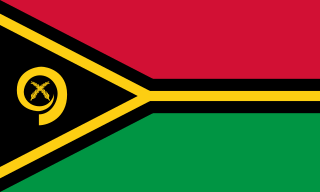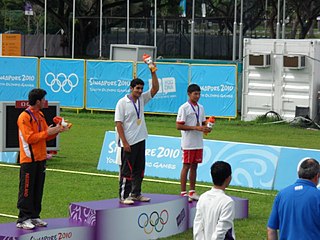
Equatorial Guinea competed at the 2004 Summer Olympics in Athens, which was held from 13 to 29 August 2004. The country's participation at Athens marked its sixth appearance in the Summer Olympics since its début at the 1984 Summer Olympics. The delegation included two athletics competitors: Roberto Mandje and Emilia Mikue Ondo in the long and middle distance disciplines respectively. Mikue Ondo was selected as the flag bearer for the opening ceremony. Both athletes did not advance further than the first round of their respective events with Mandje failing to make the start of the men's 3000 metres steeplechase.

Equatorial Guinea participated in the 2000 Summer Olympics in Sydney, Australia, which was held from 15 September to 1 October 2000. The country's participation in Sydney marked its fifth appearance in the Summer Olympics since its debut at the 1984 Summer Olympics. The delegation included one middle-distance runner, one short-distance sprinter and two swimmers: José Luis Ebatela Nvo, Mari Paz Mosanga Motanga, Eric Moussambani and Paula Barila Bolopa respectively. All four athletes qualified for the games through wildcard places. Moussambani was selected as the flag bearer for the opening ceremony. The four athletes were unable to advance beyond the first rounds of their respective events, with Moussambani and Bolopa attracting attention for their poor performances, but were applauded by the crowds.

Equatorial Guinea competed at the 1984 Summer Olympics in Los Angeles, United States, which were held from 28 July to 12 August. This was the first time the country took part in a Summer Olympics. The delegation consisted of four athletics competitors: sprinters Gustavo Envela and Secundino Borabota, and middle-distance runners Bartolomé Esono Asumu and Diosdado Lozano. All four failed to advance beyond the initial heats in their respective competitions. The best performance came from Envela who placed fifth in the eighth heat of the men's 100 metres.

Equatorial Guinea competed at the 1988 Summer Olympics in Seoul, South Korea. The National Olympic Committee sent 6 competitors to the Games in one sport.

Guinea-Bissau has sent athletes to every Summer Olympic Games held since 1996, although the country has never won an Olympic medal. No athletes from Guinea-Bissau have competed in any Winter Olympic Games.

Senegal has sent athletes to all Summer Olympic Games held since 1964. Unlike most surrounding nations, Senegal has never missed any Summer Olympics since its independence. Only once has the country won an Olympic medal: Amadou Dia Ba, who won a silver medal in the men's 400 metre hurdles in 1988. However, Abdoulaye Seye, representing France, won a bronze medal in the 200 metres in 1960, just two months after the short lived Mali Federation gained independence and a few days after Senegal seceded from the federation. Senegal will host the 2026 Summer Youth Olympics in Dakar.

Tanzania first participated at the Olympic Games in 1964, and has sent athletes to compete in every Summer Olympic Games except for the boycotted 1976 Games and has never participated in the Winter Olympic Games.

The Republic of the Congo, competing as Congo, first participated at the Olympic Games in 1964, and has sent athletes to compete in most Summer Olympic Games since then. Congo missed the 1968 Games and boycotted the 1976 Games along with most other African nations. Congo has never participated in the Winter Olympic Games.

The Democratic Republic of the Congo first participated at the Olympic Games in 1968, when it was known as Congo Kinshasa. The nation's next Olympic appearance was sixteen years later in 1984, when it was known as Zaire. The nation has sent athletes to compete in every Summer Olympic Games since then, but has never participated in the Winter Olympic Games. By the 2000 Games, the nation was once again designated Democratic Republic of the Congo.

Sudan first participated at the Olympic Games in 1960, and has sent athletes to compete in most Summer Olympic Games since then. The nation did not attend the 1964 Games in Tokyo, Japan, boycotted the 1976 Summer Olympics along with most African nations, and participated in the American-led boycott of the 1980 Summer Olympics. The nation has never participated in the Winter Olympic Games.

Mauritius first participated at the Olympic Games in 1984, and has sent athletes to compete in every Summer Olympic Games since then. The nation has never participated in the Winter Olympic Games. Mauritius also supported the American-led boycott of the 1980 Summer Olympics in Moscow.

Papua New Guinea first participated at the Olympic Games in 1976, and has sent athletes to compete in every Summer Olympic Games since then, except when the nation participated in the American-led boycott of the 1980 Summer Olympics. The nation has never won a medal and has never participated in the Winter Olympic Games.

The National Olympic Committee for Vanuatu was created in 1987 and recognized by the International Olympic Committee that same year. Vanuatu first participated at the Olympic Games in 1988 and has sent athletes to compete in every Summer Olympic Games since then. The nation has never participated in the Winter Olympic Games.

Equatorial Guinea competed at the 2008 Summer Olympics in Beijing, which was held from 8 to 24 August 2008. The country's participation at Beijing marked its seventh appearance in the Summer Olympics since its début at the 1984 Summer Olympics. The delegation included the sprinter Reginaldo Ndong, middle-distance runner Emilia Mikue Ondo and half-middleweight judoka José Mba Nchama. Ndong and Mikue Ondo qualified for the Games through wildcard places and Mba Nchama entered through his ranking at the 2007 African Judo Championships. Mikue Ondo was chosen as the flag bearer for both the opening and closing ceremonies. Ndong and Mikue Ondo progressed no farther than the first round of their respective events and Mba Nchama was eliminated from contention in the second round of the contest.

The 2010 Summer Youth Olympics, officially known as the Singapore 2010 Youth Olympic Games (YOG), were an international multi-sport event held in Singapore from 14 to 26 August 2010. The event was the inaugural Youth Olympic Games, and it saw 3,531 athletes between 14 and 18 years of age competing in 201 events in 26 sports. This medal table ranks the 204 participating National Olympic Committees (NOCs) by the number of gold medals won by their athletes. The Kuwait Olympic Committee was suspended by the International Olympic Committee (IOC) prior to the Games, but Kuwaiti athletes were allowed to participate and the country is listed in the table, bearing the Olympic flag.

Equatorial Guinea competed at the 2012 Summer Olympics in London, which was held from 27 July to 12 August 2012. The country's participation at London marked its eighth appearance in the Summer Olympics since its début at the 1984 Summer Olympics. The delegation included two track and field athletes, Benjamín Enzema and Bibiana Olama who both qualified for the Games via wildcard places because their fastest times did not meet the required qualification standards. Olama was selected as the flag bearer for both the opening and closing ceremonies. Both athletes did not advance beyond the first round of their respective events.
During the parade of nations portion of the 1984 Summer Olympics opening ceremony, athletes from each country participating in the Olympics paraded in the arena, preceded by their flag. The flag was borne by a sportsperson from that country chosen either by the National Olympic Committee or by the athletes themselves to represent their country.

Papua New Guinea competed at the 2016 Summer Olympics in Rio de Janeiro, Brazil, from 5 to 21 August 2016. This was the nation's tenth appearance at the Summer Olympics.

Equatorial Guinea competed at the 2016 Summer Olympics in Rio de Janeiro, Brazil, which was held from 5 to 21 August 2016. The country's participation at Rio marked its ninth appearance in the Summer Olympics since its début in the 1984 Summer Olympics. The delegation included two track and field athletes, Benjamin Enzema and Reïna-Flor Okori who both qualified for the Games through wildcard places since their fastest times did not meet the required qualification standards, Okori was selected as the flag bearer for the opening and closing ceremonies. Enzema did not advance beyond the qualification round for the men's 800 metres event and Okori was unable to start the women's 100 metre hurdles contest.

Equatorial Guinea competed at the 2020 Summer Olympics in Tokyo. Originally scheduled to take place from 24 July to 9 August 2020, the Games have been postponed to 23 July to 8 August 2021, due to the COVID-19 pandemic. It was the nation's tenth appearance at the Summer Olympics since its debut in 1984.











